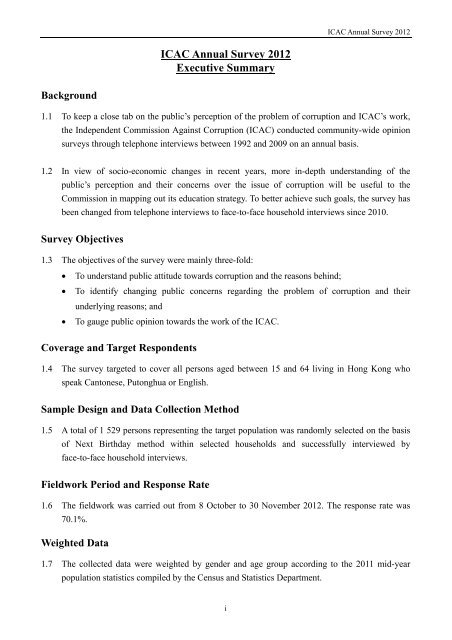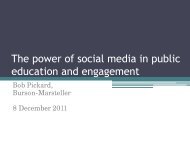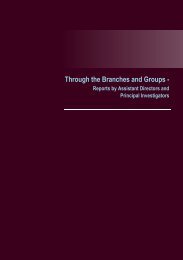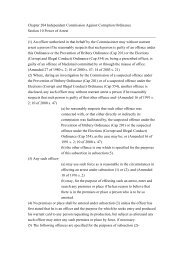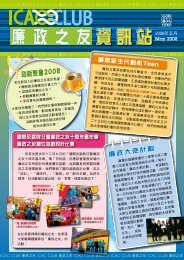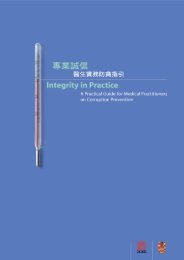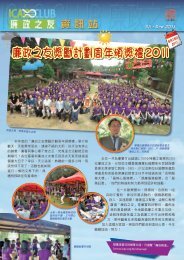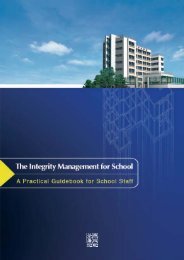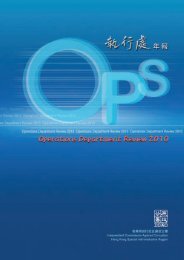ICAC Annual Survey 2012 Executive Summary
ICAC Annual Survey 2012 Executive Summary
ICAC Annual Survey 2012 Executive Summary
Create successful ePaper yourself
Turn your PDF publications into a flip-book with our unique Google optimized e-Paper software.
<strong>ICAC</strong> <strong>Annual</strong> <strong>Survey</strong> <strong>2012</strong><br />
<strong>ICAC</strong> <strong>Annual</strong> <strong>Survey</strong> <strong>2012</strong><br />
<strong>Executive</strong> <strong>Summary</strong><br />
Background<br />
1.1 To keep a close tab on the public’s perception of the problem of corruption and <strong>ICAC</strong>’s work,<br />
the Independent Commission Against Corruption (<strong>ICAC</strong>) conducted community-wide opinion<br />
surveys through telephone interviews between 1992 and 2009 on an annual basis.<br />
1.2 In view of socio-economic changes in recent years, more in-depth understanding of the<br />
public’s perception and their concerns over the issue of corruption will be useful to the<br />
Commission in mapping out its education strategy. To better achieve such goals, the survey has<br />
been changed from telephone interviews to face-to-face household interviews since 2010.<br />
<strong>Survey</strong> Objectives<br />
1.3 The objectives of the survey were mainly three-fold:<br />
• To understand public attitude towards corruption and the reasons behind;<br />
• To identify changing public concerns regarding the problem of corruption and their<br />
underlying reasons; and<br />
• To gauge public opinion towards the work of the <strong>ICAC</strong>.<br />
Coverage and Target Respondents<br />
1.4 The survey targeted to cover all persons aged between 15 and 64 living in Hong Kong who<br />
speak Cantonese, Putonghua or English.<br />
Sample Design and Data Collection Method<br />
1.5 A total of 1 529 persons representing the target population was randomly selected on the basis<br />
of Next Birthday method within selected households and successfully interviewed by<br />
face-to-face household interviews.<br />
Fieldwork Period and Response Rate<br />
1.6 The fieldwork was carried out from 8 October to 30 November <strong>2012</strong>. The response rate was<br />
70.1%.<br />
Weighted Data<br />
1.7 The collected data were weighted by gender and age group according to the 2011 mid-year<br />
population statistics compiled by the Census and Statistics Department.<br />
i
<strong>ICAC</strong> <strong>Annual</strong> <strong>Survey</strong> <strong>2012</strong><br />
Report of <strong>Survey</strong> Findings<br />
1.8 In the tables presented in this executive summary, the weighted figures and percentage figures<br />
may not add up to totals (i.e. 100%) because of rounding of decimal points.<br />
ii
<strong>ICAC</strong> <strong>Annual</strong> <strong>Survey</strong> <strong>2012</strong><br />
<strong>Summary</strong> of Key Findings<br />
A. Public Attitude towards Corruption<br />
Tolerance of corruption in Hong Kong (Table A-a)<br />
1.9 On a 0 to 10 scale where 0 represents total intolerance and 10 represents total tolerance, the<br />
mean score was 0.8, reflecting a low tolerance of corruption amongst the public. Of the<br />
respondents, 77.0% considered corruption in Hong Kong totally intolerable (i.e. a score of 0)<br />
and 14.4% gave a score between 1 and 3. Only a small proportion of respondents (1.4%) gave<br />
a score between 7 and 9 while a very low percentage (0.4%) considered corruption in Hong<br />
Kong totally tolerable (i.e. a score of 10). The mean score was similar to that recorded in 2011<br />
(0.7).<br />
1.10 Amongst those (23.0%) giving a score between 1 and 10, the most cited reasons for tolerance<br />
included: “corruption was unavoidable in society” (51.4%), “if corruption involved small<br />
amount of benefit (less than $1,000)” (16.3%) and “treating a free meal was common” (9.0%).<br />
Willingness to report corruption (Table A-a)<br />
1.11 The majority (79.2%) of the respondents indicated that they would report corruption if they<br />
were aware that someone had committed corruption, slightly higher than those of 2011 (77.2%),<br />
2010 (75.9%) and 2009 (75.3%). 14.1% replied it would depend on circumstances. Only 5.1%<br />
of the respondents would not report at all, the second lowest score from 2009 to <strong>2012</strong><br />
inclusive.<br />
1.12 Among those who were reluctant to report corruption, “troublesome – did not specify any<br />
reasons” (29.6%), “troublesome – reporting procedures/follow-up interviews by <strong>ICAC</strong>”<br />
(26.0%) and “it did not concern me” (24.8%) were three major reasons given.<br />
1.13 Among those who said that whether they would report corruption would depend on<br />
circumstances, 36.1% would consider “the likely effect to work and safety of respondents and<br />
their relatives/friends”, followed by “the likely effect to public interests” (17.0%) and “the<br />
likely benefit to respondents and their relatives/friends” (16.2%).<br />
iii
<strong>ICAC</strong> <strong>Annual</strong> <strong>Survey</strong> <strong>2012</strong><br />
Table A-a<br />
2009 1 2010 2 2011 2 <strong>2012</strong> 2<br />
Tolerance of corruption in Hong Kong @<br />
0 (Total intolerance) - 68.6% 78.4% 77.0%<br />
1 - 3.2% 3.5% 3.4%<br />
2 - 6.5% 5.4% 5.8%<br />
3 - 5.7% 5.2% 5.2%<br />
4 - 2.1% 1.2% 1.8%<br />
5 - 7.1% 3.4% 4.0%<br />
6 - 1.7% 0.6% 1.2%<br />
7 - 1.9% 1.2% 0.8%<br />
8 - 2.0% 0.8% 0.6%<br />
9 - 0.4% 0.2% 0.0%<br />
10 (Total tolerance) - 0.8% 0.1% 0.4%<br />
Mean score*: - 1.3 0.7 0.8<br />
Mean score (tolerance of corruption in<br />
government departments) @<br />
Mean score (tolerance of corruption in<br />
business sector) @<br />
1.1 - - -<br />
1.6 - - -<br />
Willingness to report corruption #<br />
- Willing 75.3% 75.9% 77.2% 79.2%<br />
- Unwilling 8.1% 5.3% 4.7% 5.1%<br />
- Depending on circumstances 13.5% 15.9% 15.5% 14.1%<br />
- Don’t know/no opinion 3.1% 2.9% 2.6% 1.5%<br />
Notes<br />
1<br />
The mode of interview used in <strong>ICAC</strong> <strong>Annual</strong> <strong>Survey</strong> 2009 was telephone interview and weighting was not<br />
applied to the findings.<br />
2<br />
The mode of interview used in <strong>ICAC</strong> <strong>Annual</strong> <strong>Survey</strong> since 2010 were face-to-face household interview and the<br />
survey results were weighted by gender and age group according to the mid-year population statistics compiled by<br />
the Census and Statistics Department.<br />
* Significant difference was found among the findings of the past three years at 0.01 significance level.<br />
#<br />
Significant difference was found among the findings of the four years at 0.01 significance level.<br />
@<br />
Since 2010, respondents were only asked to rate the tolerance level towards the overall corruption in Hong Kong.<br />
Before 2010, they were asked to indicate the tolerance level of corruption in government departments and<br />
business sector in two separate questions. Therefore the mean score for 2010 (1.3), 2011 (0.7) and <strong>2012</strong> (0.8)<br />
cannot be directly compared with previous mean scores.<br />
iv
<strong>ICAC</strong> <strong>Annual</strong> <strong>Survey</strong> <strong>2012</strong><br />
Acceptance level towards different corrupt behaviour (Table A-b)<br />
1.14 With regard to the six different corruption scenarios, a vast majority of the respondents<br />
(87.6% – 99.2%) considered the acts unacceptable.<br />
1.15 The proportion of respondents considering the acts described in the scenarios acceptable<br />
ranged from 0.2% – 5.9%, while 0.1% – 4.9% replied it would depend on circumstances:<br />
• On the scenario of “A company staff exaggerates his/her travelling expenses when making<br />
claims from the company”, the most commonly cited reason was that “exaggerated amount<br />
below $1,000 was acceptable”;<br />
• On the scenario of “A restaurant buyer accepts rebates from meat suppliers without the<br />
knowledge of the restaurant operator”, the most common reason was “custom/trade<br />
practice”;<br />
• On the scenario of “A frontline law enforcement officer of the government solicits festive<br />
‘laisees’ from shop owners”, the major reason was that “gift less than $1,000 was<br />
acceptable”; and<br />
• On the scenario of “A civil servant helps his/her relatives to bid the department’s tender by<br />
providing internal information”, the major reason was that “they were his/her<br />
relatives/friends”.<br />
1.16 A vast majority of the respondents (82.2% – 98.1%) considered the acts depicted in the six<br />
corruption scenarios illegal. The proportion of respondents who considered the acts legal<br />
ranged from 0.7% – 11.3%, while 0.8% – 6.6% did not express any views.<br />
v
<strong>ICAC</strong> <strong>Annual</strong> <strong>Survey</strong> <strong>2012</strong><br />
Table A-b<br />
Different corrupt<br />
behaviour<br />
(i) A company staff<br />
exaggerates his/her<br />
travelling expenses when<br />
making claims from the<br />
company.<br />
(ii) A restaurant buyer accepts<br />
rebates from meat suppliers<br />
without the knowledge of<br />
the restaurant operator.<br />
(iii) A frontline law<br />
enforcement officer of the<br />
government solicits festive<br />
‘laisees’ from shop owners.<br />
(iv) A civil servant helps his/her<br />
relatives to bid the<br />
department’s tender by<br />
providing internal<br />
information.<br />
(v) A member of an owners’<br />
incorporation accepts gifts<br />
from the maintenance<br />
contractor and agrees to<br />
consider using material<br />
which did not conform with<br />
the tender specifications.<br />
(vi) The operator of<br />
entertainment business<br />
offers advantages to<br />
government officers for<br />
lenient treatments in the<br />
inspection of fire safety<br />
facilities.<br />
Acceptable<br />
Acceptance level<br />
Depend on<br />
circumstances Unacceptable<br />
Whether the act is illegal<br />
Don’t<br />
know/no<br />
comment Yes No<br />
Don’t<br />
know/no<br />
comment<br />
5.9% 4.9% 87.6% 1.6% 82.2% 11.3% 6.6%<br />
5.8% 2.8% 88.5% 2.8% 88.1% 6.2% 5.7%<br />
1.6% 1.6% 96.3% 0.5% 94.4% 3.6% 1.9%<br />
1.3% 0.5% 97.4% 0.8% 95.6% 1.9% 2.5%<br />
0.4% 0.1% 99.1% 0.4% 98.0% 0.7% 1.3%<br />
0.2% 0.2% 99.2% 0.4% 98.1% 1.1% 0.8%<br />
vi
<strong>ICAC</strong> <strong>Annual</strong> <strong>Survey</strong> <strong>2012</strong><br />
Perceived prevalence of corruption in Hong Kong (Table A-c)<br />
1.17 25.4% considered corruption common in Hong Kong, higher than those of 2010 (20.9%) and<br />
2011 (18.4%), but lower than that of 2009 (30.9%). 68.5% of the respondents perceived<br />
corruption uncommon which was lower than those recorded in 2010 (71.0%) and 2011 (71.3%).<br />
6.0% of the respondents did not express any views, the lowest since 2009.<br />
1.18 The main reasons for considering corruption common in Hong Kong included: “respondents<br />
learnt of many corruption cases from the media” (51.6%), “corruption was a common practice<br />
in doing business for some trades” (25.4%) and “corruption was observed in the Government,<br />
senior government officials and civil servants” (13.6%).<br />
1.19 On the other hand, the major reasons for perceiving corruption uncommon in Hong Kong were<br />
that “respondents learnt of corruption cases from the media less frequently” (36.6%), “ strong<br />
deterrence of the <strong>ICAC</strong>” (17.9%) and “respondents themselves, their relatives and friends<br />
seldom/had not heard about/come across corruption” (17.4%).<br />
Encounter with corruption in the past 12 months (Table A-c)<br />
1.20 The vast majority (98.1%) of the respondents indicated that they themselves had not come<br />
across corruption in the past 12 months, similar to that recorded in 2011. Only 1.8% said that<br />
they had and 0.2% did not express any views.<br />
1.21 94.1% of the respondents said that their relatives and friends had not come across corruption in<br />
the past 12 months, similar to that recorded in 2011. 2.5% said they had, higher than those of<br />
2010 (1.4%) and 2011 (1.3%). 3.4% did not express any views.<br />
vii
<strong>ICAC</strong> <strong>Annual</strong> <strong>Survey</strong> <strong>2012</strong><br />
Table A-c<br />
2009 1 2010 2 2011 2 <strong>2012</strong> 2<br />
Perceived prevalence of corruption in Hong<br />
Kong *#^<br />
- Very common/quite common 30.9% 20.9% 18.4% 25.4%<br />
- Not quite common/very uncommon 59.9% 71.0% 71.3% 68.5%<br />
- Don’t know/no opinion 9.2% 8.1% 10.3% 6.0%<br />
Whether respondents had come across<br />
corruption in the past 12 months @<br />
- Yes - 2.2% 1.2% 1.8%<br />
- No - 97.4% 98.5% 98.1%<br />
- Don’t know/no opinion - 0.4% 0.3% 0.2%<br />
Whether respondents’ relatives or friends<br />
had come across corruption in the past 12<br />
months @∆<br />
- Yes - 1.4% 1.3% 2.5%<br />
- No - 93.6% 95.2% 94.1%<br />
- Don’t know/no opinion - 5.0% 3.5% 3.4%<br />
Whether respondents, their relatives or<br />
friends had come across corruption in the<br />
past 12 months @<br />
- Yes 2.5% - - -<br />
- No 94.7% - - -<br />
- Don’t know/no opinion 2.9% - - -<br />
Notes<br />
1<br />
The mode of interview used in <strong>ICAC</strong> <strong>Annual</strong> <strong>Survey</strong> 2009 was telephone interview and weighting was not<br />
applied to the findings.<br />
2<br />
The mode of interview used in <strong>ICAC</strong> <strong>Annual</strong> <strong>Survey</strong> since 2010 were face-to-face household interview and the<br />
survey results were weighted by gender and age group according to the mid-year population statistics compiled by<br />
the Census and Statistics Department.<br />
* The findings were significantly different from those of 2011 at 0.01 significance level.<br />
∆ Significant difference was found among the findings of the three years at 0.01 significance level.<br />
#<br />
Significant difference was found among the findings of the four years at 0.01 significance level.<br />
^<br />
@<br />
Before 2010, the rating scale was: very common, quite common, uncommon, very uncommon.<br />
Before 2010, only one question was set to ask the respondents whether they themselves, their relatives or friends<br />
had come across corruption in the past 12 months. Since 2010, the question was split into two: one asked on the<br />
respondents themselves and the other on respondents’ relatives and friends. Therefore the percentage figures since<br />
2010 cannot be directly compared with the previous percentage figures.<br />
viii
<strong>ICAC</strong> <strong>Annual</strong> <strong>Survey</strong> <strong>2012</strong><br />
B. Public Concern over Corruption Problem<br />
Perceived importance of keeping Hong Kong corruption-free to the overall development of<br />
Hong Kong (Table B)<br />
1.22 Almost all respondents (98.8%) agreed that keeping Hong Kong corruption-free was important<br />
to the overall development of Hong Kong, which was slightly lower than that of 2011 (99.2%).<br />
Only a tiny proportion (0.2%) held opposite views and 1.0% did not express any views.<br />
1.23 Among the respondents who thought that keeping Hong Kong corruption-free was important,<br />
the most common reasons were “to help uphold fairness and justice” (43.2%), “to help<br />
economic and commercial development of Hong Kong” (19.2%) and “to help attract foreign<br />
investments” (14.5%).<br />
Perceived changes in the level of corruption next year (Table B)<br />
1.24 More than two-thirds (67.5%) of the respondents perceived that the level of corruption would<br />
remain more or less the same. 14.0% of the respondents considered the level of corruption<br />
would increase; while 10.1% of the respondents thought that it would decrease. As compared<br />
with 2010 and 2011, the proportion of respondents who believed corruption would increase<br />
next year was the highest, while the proportion of “don’t know/no opinion” (8.5%) was the<br />
lowest. The proportion of respondents who believed corruption would decrease next year was<br />
slightly higher than that of 2011 (9.5%), but still lower than that of 2010 (13.3%).<br />
1.25 For those respondents who believed corruption would increase next year, the major reason was<br />
“influence of the culture in the Mainland” (47.9%). The second most commonly cited reason<br />
was “closer co-operation/more economic activities between Hong Kong and the Mainland”<br />
(31.3%), followed by “people are eager to earn more money/money is everything” (17.8%).<br />
1.26 For those respondents who thought that corruption would decrease next year, the most<br />
commonly cited reasons were “the <strong>ICAC</strong> was effective in fighting corruption” (28.3%), “strong<br />
deterrence of the <strong>ICAC</strong>” (25.1%) and “public awareness of anti-corruption had increased”<br />
(23.4%) .<br />
ix
<strong>ICAC</strong> <strong>Annual</strong> <strong>Survey</strong> <strong>2012</strong><br />
Table B<br />
2009 1 2010 2 2011 2 <strong>2012</strong> 2<br />
Perceived importance of keeping Hong Kong<br />
corruption-free to overall development of<br />
Hong Kong #@<br />
- Very important/quite important - 96.3% 99.2% 98.8%<br />
- Not quite important/very unimportant - 1.0% 0.2% 0.2%<br />
- Don’t know/no opinion - 2.7% 0.6% 1.0%<br />
Perceived changes in the level of corruption<br />
next year *#^<br />
- Will increase - 12.9% 11.0% 14.0%<br />
- Will decrease - 13.3% 9.5% 10.1%<br />
- More or less the same as at present - 65.3% 68.0% 67.5%<br />
- Don’t know/no opinion - 8.6% 11.4% 8.5%<br />
Notes<br />
1<br />
The mode of interview used in <strong>ICAC</strong> <strong>Annual</strong> <strong>Survey</strong> 2009 was telephone interview and weighting was not<br />
applied to the findings.<br />
2<br />
The mode of interview used in <strong>ICAC</strong> <strong>Annual</strong> <strong>Survey</strong> since 2010 were face-to-face household interview and the<br />
survey results were weighted by gender and age group according to the mid-year population statistics compiled by<br />
the Census and Statistics Department.<br />
* The findings were significantly different from those of 2011 at 0.01 significance level.<br />
#<br />
Significant difference was found among the findings of the three years at 0.01 significance level.<br />
@ This question has been introduced since 2010.<br />
^ This question was not asked in 2009.<br />
x
<strong>ICAC</strong> <strong>Annual</strong> <strong>Survey</strong> <strong>2012</strong><br />
Perception of corruption problem in different sectors<br />
1.27 With regard to corruption problem in different sectors in Hong Kong, “government officials/<br />
civil servants” (19.5%) topped the list as the area of greatest concern, followed by “real estate<br />
industry” (17.7%) and “construction and engineering industry” (16.8%). 10.1% of the<br />
respondents did not express any opinions.<br />
1.28 Among those who opted “government officials/civil servants” as the sector of greatest concern,<br />
the main reasons were “it affected people’s livelihood/interest of the public” (61.5%), “they<br />
were in high position and had much power in society” (19.8%) and “it would affect the<br />
society’s fairness” (16.3%).<br />
1.29 Among those respondents who thought that corruption problem in “real estate industry” was<br />
their greatest concern, about half of them (48.8%) indicated that the reason for their concern<br />
was “high property prices caused by developers”, followed by “it affected people’s<br />
livelihood/interest of the public” (41.5%) and “large amount of money involved was conducive<br />
to corruption” (26.8%).<br />
1.30 For those respondents who believed that “construction and engineering industry” was worthy<br />
of the greatest concern, the major reasons stated were “it affected people’s livelihood/interest<br />
of the public” (65.1%), “corruption would result in substandard works or materials/it affected<br />
the quality of construction works” (60.1%) and “large amount of money involved was<br />
conducive to corruption” (20.4%).<br />
xi
<strong>ICAC</strong> <strong>Annual</strong> <strong>Survey</strong> <strong>2012</strong><br />
C. Public Opinion towards the Work of the <strong>ICAC</strong><br />
Effectiveness of <strong>ICAC</strong>’s anti-corruption work (Table C)<br />
1.31 Similar to 2011, the majority of the respondents (88.3%) considered <strong>ICAC</strong>’s anti-corruption<br />
work effective. 6.5% of the respondents held opposite views while 5.1% did not express any<br />
opinions.<br />
1.32 For those respondents who considered <strong>ICAC</strong>’s anti-corruption work effective, most of them<br />
attributed their opinions to “strong deterrence of the <strong>ICAC</strong>” (23.9%), “media reports” (20.5%)<br />
and “seldom learnt of corruption cases from the media” (16.2%).<br />
1.33 The main reason cited by respondents for considering <strong>ICAC</strong>’s anti-corruption work ineffective<br />
was “not successful in investigations/investigations not effective” (76.0%).<br />
Support for the <strong>ICAC</strong> (Table C)<br />
1.34 Nearly all respondents (98.7%) stated that the <strong>ICAC</strong> deserved their support. The level of<br />
support remained consistently high. Only 0.4% of the respondents thought the opposite while<br />
0.9% did not express any views, which was the lowest in the recent four years.<br />
1.35 Among the respondents who said that the <strong>ICAC</strong> deserved their support, most believed the<br />
<strong>ICAC</strong> could help “maintain a corruption-free society” (34.0%), “uphold fairness and justice”<br />
(32.3%) and “the <strong>ICAC</strong> was effective in fighting corruption” (13.2%).<br />
xii
<strong>ICAC</strong> <strong>Annual</strong> <strong>Survey</strong> <strong>2012</strong><br />
Table C<br />
2009 1 2010 2 2011 2 <strong>2012</strong> 2<br />
Effectiveness of <strong>ICAC</strong>’s anti-corruption work ^<br />
- Very effective/quite effective 68.3% 87.4% 87.8% 88.3%<br />
- Average 23.9% - - -<br />
- Not quite effective/very ineffective 2.2% 4.8% 5.5% 6.5%<br />
- Don’t know/no opinion 5.6% 7.9% 6.7% 5.1%<br />
Support for the <strong>ICAC</strong> #*<br />
- Deserved 97.9% 97.1% 98.0% 98.7%<br />
- Not deserved 0.6% 0.3% 0.1% 0.4%<br />
- Don’t know/no opinion 1.5% 2.6% 2.0% 0.9%<br />
Notes<br />
1<br />
The mode of interview used in <strong>ICAC</strong> <strong>Annual</strong> <strong>Survey</strong> 2009 was telephone interview and weighting was not<br />
applied to the findings.<br />
2<br />
The mode of interview used in <strong>ICAC</strong> <strong>Annual</strong> <strong>Survey</strong> since 2010 were face-to-face household interview and the<br />
survey results were weighted by gender and age group according to the mid-year population statistics compiled by<br />
the Census and Statistics Department.<br />
#<br />
Significant difference was found among the findings of the four years at 0.01 significance level.<br />
* The findings were significantly different from those of 2011 at 0.01 significance level.<br />
^ Since 2010, a four-point scale (i.e. very effective, quite effective, not quite effective, very ineffective) was used in<br />
this question. This was consistent with all other questions involving ratings in the surveys since 2010. Before<br />
2010, a five-point scale was used in this question (i.e. very effective, effective, average, ineffective, very<br />
ineffective). Therefore the findings since 2010 cannot be directly compared with those of 2009.<br />
xiii
<strong>ICAC</strong> <strong>Annual</strong> <strong>Survey</strong> <strong>2012</strong><br />
Aspects of work the <strong>ICAC</strong> should strengthen<br />
1.36 With regard to the aspects of work that the <strong>ICAC</strong> should strengthen, more than half of the<br />
respondents (52.3%) mentioned “publicity and education work for anti-corruption” and 23.4%<br />
of the respondents mentioned “law enforcement work”.<br />
1.37 For those respondents who said that the <strong>ICAC</strong> should strengthen “publicity and education work<br />
for anti-corruption”, the major reason was “to enhance public awareness of anti-corruption”<br />
(52.1%). The second most common reason was “insufficient publicity work” (28.7%).<br />
1.38 On the other hand, the main reasons cited by respondents who considered that the <strong>ICAC</strong> should<br />
strengthen “law enforcement work” were “to raise the effectiveness of investigation” (66.8%),<br />
“to keep the society corruption-free which will enhance the society’s reputation and image”<br />
(10.8%) and “to enhance deterrent effect” (9.4%).<br />
Target groups that the <strong>ICAC</strong> should strengthen prevention and education work<br />
1.39 Among the respondents, 39.1% of them indicated that the <strong>ICAC</strong> should strengthen corruption<br />
prevention and education work for “students”. The next top target groups were “government<br />
departments/civil servants/councillors” (32.5%), real estate/construction industries (13.4%),<br />
“youth” (13.4%) and “new arrivals” (9.2%).<br />
1.40 “Conducting talks/seminars” was the most commonly cited format for the <strong>ICAC</strong> to strengthen<br />
corruption prevention and education work for such target groups.<br />
xiv


